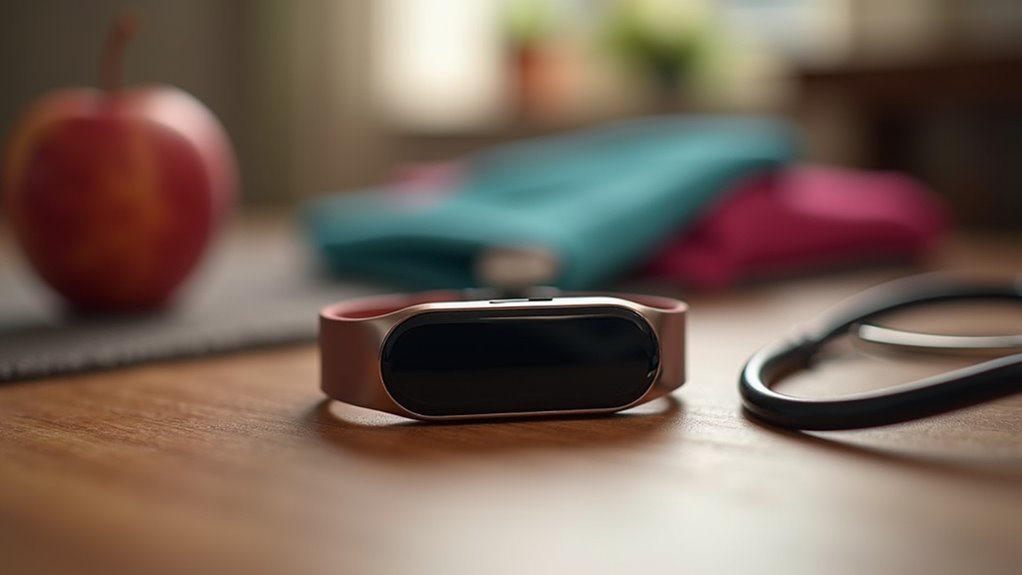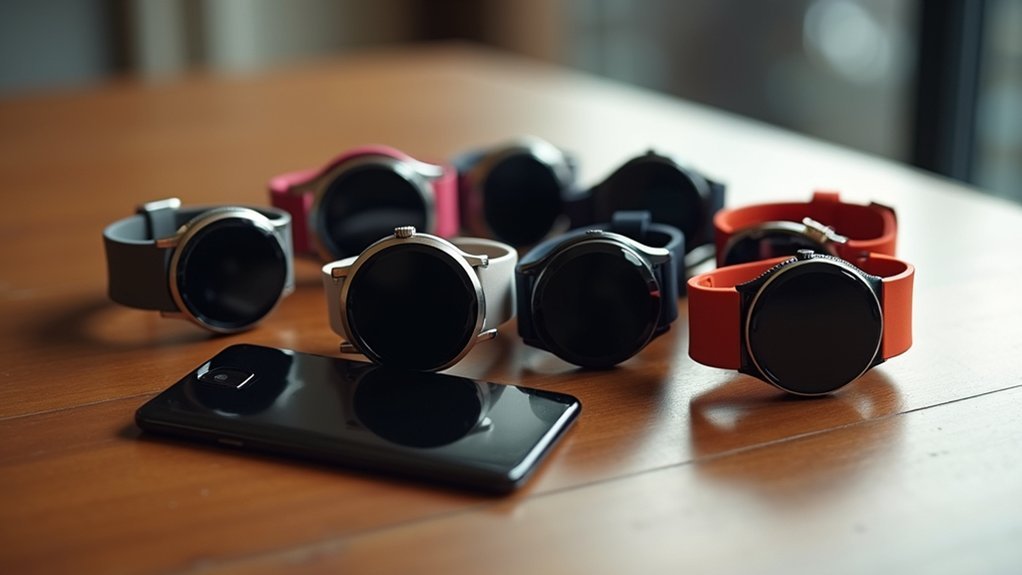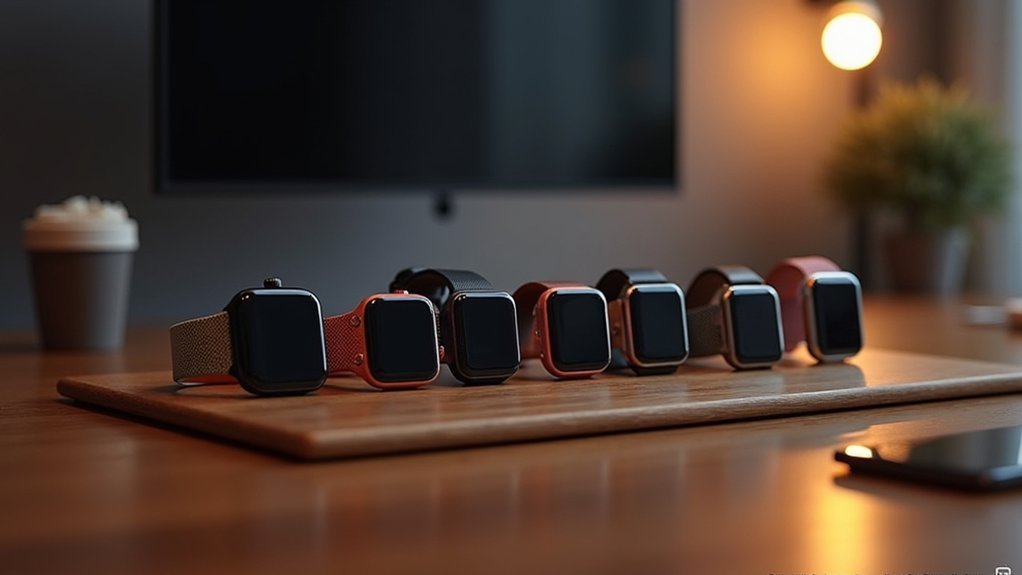You can access professional-grade ECG monitoring for under $100 with budget fitness trackers that offer the same heart rhythm detection capabilities as premium smartwatches. These devices provide continuous heart rate monitoring, sleep analysis, and can detect irregular rhythms like atrial fibrillation within 30 seconds. They’re user-friendly with simple one-button activation and smartphone app integration that lets you share results with healthcare providers. Discover how these affordable options are revolutionizing accessible heart health monitoring.
Cost-Effectiveness of Budget ECG Fitness Trackers
Budget ECG fitness trackers are revolutionizing heart health monitoring by making this advanced technology accessible for under $150, with many quality options available between $60-$100.
You’ll find major brands like Amazfit and Fitbit offering ECG features without significant markups, making heart monitoring affordable for everyone.
These devices deliver exceptional value by bundling ECG with essential health features like heart rate monitoring, sleep tracking, activity measurement, and SpO2 readings. The user-friendly interfaces make it simple to navigate through your health data and access important metrics without technical complexity.
You’re getting thorough health insights at a fraction of premium device costs. The battery life often matches or exceeds expensive models, maximizing your usage per charge.
While these trackers provide actionable heart rhythm data and can alert you to seek medical advice when irregularities appear, they’re designed for general health awareness rather than clinical diagnosis.
Essential Health Monitoring Features at Lower Prices
You don’t need to spend hundreds of dollars to access extensive health monitoring features that were once exclusive to premium devices.
Budget fitness trackers now offer essential capabilities like ECG readings, continuous heart rate monitoring, and sleep analysis at prices that won’t strain your wallet.
We’ll examine how these core tracking features compare between affordable and high-end models, helping you understand what you’re getting for your investment. These affordable devices can even help you target specific heart rate zones to maximize the cardiovascular benefits of your workouts.
Core Health Tracking Features
While premium fitness trackers once dominated the health monitoring market, today’s budget devices pack impressive core tracking capabilities that rival their expensive counterparts.
You’ll get extensive activity tracking that monitors your steps, distance, calories burned, and active minutes throughout each day. Continuous heart rate monitoring helps you manage workout intensity while observing resting heart trends over time.
Sleep stage analysis tracks your duration and quality, breaking down light, deep, and REM sleep phases.
Stress monitoring uses heart rate variability to measure your physical stress levels for better mental health management. Multiple workout modes support various activities like running, cycling, and yoga, often featuring auto-detection. Many budget trackers now support 120 activity types, giving you comprehensive tracking options for virtually any exercise routine.
These essential features provide the foundation you need for effective health monitoring without breaking your budget.
Affordable ECG Technology Benefits
Although ECG technology was once exclusive to expensive medical devices and premium smartwatches, today’s affordable fitness trackers deliver the same life-saving cardiac monitoring capabilities at a fraction of the cost.
You’ll get reliable detection of irregular heart rhythms like atrial fibrillation without compromising essential functionality. This democratizes access to advanced health monitoring, reaching demographics who couldn’t afford premium devices.
You can record ECGs whenever symptoms occur, sharing data with healthcare providers for timely intervention. Real-time notifications alert you to potential issues before they worsen, empowering proactive heart health management from home.
The simplified interfaces make monitoring accessible across all ages, while longitudinal data collection supports informed discussions with doctors and reveals patterns over time. These devices provide continuous monitoring capabilities that help capture transient AFib episodes that traditional monitoring methods often miss.
Budget Vs Premium Comparison
Three key factors separate budget ECG fitness trackers from their premium counterparts: price, feature breadth, and build quality. You’ll find budget models under $100 deliver essential health monitoring capabilities, while premium devices exceed $300 with advanced sensors you might not need.
| Feature | Budget ECG Trackers | Premium Models |
|---|---|---|
| Price Range | Under $100 | $300+ |
| Battery Life | Up to 21 days | Shorter duration |
| Display Quality | TFT/Basic OLED | High-res AMOLED |
| GPS Accuracy | Limited/Absent | Built-in precision |
| Advanced Metrics | Basic monitoring | VO2 max, recovery time |
Budget trackers excel in core functions like ECG detection, heart rate monitoring, and sleep tracking. However, you’ll sacrifice GPS accuracy, advanced health metrics, and premium build materials. The extended battery life in budget models often outperforms expensive alternatives.
Simplicity and Ease of Use for Everyday Health Tracking
Simplicity stands at the heart of what makes budget fitness trackers with ECG functionality so appealing for everyday users.
You’ll find these devices feature compact designs that won’t interfere with your daily activities, whether you’re at work or exercising. The streamlined interfaces use icon-based navigation, so you can quickly access your health data without technical confusion.
Your tracking becomes effortless through automatic exercise detection and continuous heart rate monitoring. The user-friendly apps sync seamlessly via Bluetooth, displaying clear metrics that you can understand at a glance.
You can customize settings to match your specific health goals while enjoying features like sleep tracking, step counting, and ECG functionality. This straightforward approach means you’ll actually use your tracker consistently, making it an effective tool for improving your health.
Making Heart Health Monitoring Accessible to Everyone

While premium heart monitors once cost hundreds of dollars and required medical appointments, budget fitness trackers with ECG functionality have revolutionized who can access this essential health technology.
You can now purchase ECG-capable devices like the Xiaomi Mi Smart Band for under $50, making heart health monitoring affordable for millions more people. These trackers are widely available through online and in-store retailers, eliminating barriers to purchase.
Corporate wellness programs further expand access, with over 15% of fitness tracker sales coming from workplace initiatives. Your employer might even offer financial incentives like lower insurance premiums for participation.
The rapidly expanding fitness tracker market, projected to grow at 18.04% annually through 2034, continues driving prices down while improving ECG features that were once exclusive to expensive medical devices. The Asia-Pacific region shows particularly strong growth potential with a projected 22% CAGR through 2030, creating more competitive pricing options for budget-conscious consumers seeking ECG functionality.
Key ECG Features to Look for in Budget Models
When evaluating budget ECG fitness trackers, you’ll want to prioritize devices that can detect atrial fibrillation, the most common serious heart rhythm disorder affecting millions worldwide.
Look for one-button ECG activation that makes testing simple whenever you feel symptoms. Guarantee the device provides clear notifications for abnormal results and can save or export readings as PDFs for your doctor.
Simple one-button activation and clear abnormal result notifications with PDF export capability ensure seamless communication with your healthcare provider.
Choose trackers that integrate continuous optical heart rate monitoring with ECG functionality. This combination helps establish baseline patterns and triggers ECG checks when elevated or irregular rates occur.
Heart rate variability tracking adds valuable stress and recovery insights.
Consider models with smartphone apps that guide you through the ECG process step-by-step and display results clearly, requiring no medical expertise to operate effectively.
How Budget Trackers Compare to Premium Smartwatches

Budget fitness trackers with ECG functionality offer a compelling alternative to premium smartwatches, delivering essential heart monitoring capabilities at a fraction of the cost.
While you’ll sacrifice advanced features like third-party apps, GPS, or LTE connectivity, you’ll gain significant advantages in battery life and simplicity. Budget trackers typically last several days to weeks on a single charge, compared to daily charging requirements for many premium devices.
You’ll enjoy a distraction-free experience focused on core health metrics—steps, heart rate, sleep tracking, and ECG monitoring. The streamlined interface eliminates complex navigation and reduces interruptions from notifications.
Though customization options are limited, you’ll benefit from lightweight, comfortable designs optimized for all-day wear. For users prioritizing heart health monitoring without premium pricing, budget ECG trackers provide excellent value.
Early Detection and Proactive Heart Health Management
You can catch atrial fibrillation early with budget ECG trackers, potentially preventing strokes and heart complications before they become serious.
These devices monitor your heart rate variability patterns over time, giving you insights into your cardiovascular health that you might otherwise miss. Modern trackers can detect multiple arrhythmias including bradycardia and tachycardia within just 30 seconds of monitoring.
When you share this data with your doctor, you’re creating a detailed picture of your heart health that enables more informed medical decisions.
Detecting Atrial Fibrillation Early
Although atrial fibrillation affects approximately 10.5 million Americans with nearly 900,000 new cases emerging annually, many people remain unaware they’ve this common arrhythmia until serious complications develop.
You’re at greater risk as you age, making early detection essential for preventing stroke and heart failure.
Budget fitness trackers with ECG capabilities offer you continuous monitoring during daily activities, catching intermittent AF episodes that traditional screenings might miss.
You’ll benefit from the convenience and cost-effectiveness of having single-lead ECG technology on your wrist.
When you detect AF early, you can start anticoagulation therapy promptly, greatly reducing your stroke risk.
This proactive approach helps you make necessary lifestyle changes and maintains better heart health management before complications arise.
Monitoring Heart Rate Variability
When your heart beats, the time intervals between each beat naturally vary—a phenomenon called Heart Rate Variability (HRV) that reflects how well your autonomic nervous system regulates cardiovascular function.
Higher HRV indicates better cardiovascular fitness and stress resilience, while declining patterns can signal fatigue, chronic stress, or early cardiac issues before symptoms appear.
Budget ECG trackers capture precise R-R intervals needed for accurate HRV readings, unlike basic optical sensors that only estimate values.
You’ll receive real-time data showing sympathetic and parasympathetic nervous system balance, enabling proactive lifestyle adjustments. Research demonstrates that HRV correlates with enhancements in cognitive, behavioral, emotional, and physical functions.
These devices alert you when HRV indicates deteriorating autonomic function, helping you schedule exercise, rest, and stress management based on your heart’s readiness.
This continuous monitoring empowers early intervention and cardiovascular risk reduction.
Sharing Data With Doctors
Most people who monitor their heart health with budget ECG trackers never share that valuable data with their doctors, missing critical opportunities for early detection and intervention. When you share your tracker data, you’re enabling proactive health management that can catch irregular rhythms like atrial fibrillation before they become dangerous.
| Benefit | Impact |
|---|---|
| Early Detection | Identifies heart issues before symptoms appear |
| Proactive Care | Enables intervention between annual check-ups |
| Better Diagnosis | Provides continuous monitoring vs. snapshot visits |
| Improved Outcomes | Reduces risk of serious complications |
You’ll increase your engagement in healthcare decisions and help your doctor spot patterns they’d otherwise miss. Data can be swiftly shared with physicians across vast distances, transforming how you and your healthcare provider collaborate on heart health monitoring. Don’t let valuable heart data sit unused on your device.
Current Market Trends in Affordable ECG Wearables
The affordable ECG wearable market is experiencing unprecedented growth, with projections showing a remarkable 22.1% compound annual growth rate from 2025 to 2032.
You’re witnessing a market that’s expanded from $62 billion in 2024 and is expected to reach $290 billion by 2032.
What’s driving this explosive growth? Your increasing health awareness and technological advancements are reshaping the industry.
Over 40% of buyers now prioritize ECG monitoring when selecting devices, showing you’re no longer satisfied with basic step counting.
Major players like Apple, Fitbit, Garmin, and Xiaomi are responding by making ECG features more accessible. The online segment is expected to dominate this growing market due to increasing internet penetration, making these devices more accessible to consumers worldwide.
You’ll find devices like the Fitbit Charge 6 offering advanced ECG monitoring at around $130, while basic models start at just $20-$50.
Future Developments in Budget Health Monitoring Technology
As budget fitness trackers continue evolving beyond basic step counting, you’re about to witness revolutionary changes that’ll transform how these affordable devices monitor your health.
AI-powered algorithms will soon analyze your ECG data to predict potential heart issues before symptoms appear, enabling proactive intervention.
You’ll see enhanced integration with electronic health records, allowing your doctor to access real-time data during appointments.
Advanced IoMT connectivity will enable your budget tracker to communicate seamlessly with other health devices, creating a thorough monitoring ecosystem.
Expect expanded metrics like blood glucose monitoring and sleep apnea detection in affordable models.
These developments will deliver personalized healthcare insights previously reserved for expensive medical equipment, making professional-grade health monitoring accessible to everyone. Remote monitoring capabilities will enable specialty care access even in remote locations, bringing expert medical guidance directly to your wrist regardless of geographical barriers.
Frequently Asked Questions
Are Budget ECG Fitness Trackers FDA Approved for Medical Use?
You’ll find most budget ECG fitness trackers aren’t FDA-approved for medical use. They lack required clinical validation and safety testing that premium brands like Apple, Samsung, and Fitbit have obtained for their devices.
How Often Should I Calibrate My Budget ECG Fitness Tracker?
You should calibrate your budget ECG fitness tracker during initial setup over several days, then recalibrate every 1-3 months, after battery replacements, software updates, or when readings seem inaccurate.
Can Budget ECG Trackers Detect Heart Attacks or Just Arrhythmias?
Budget ECG trackers can’t accurately detect heart attacks – they’re primarily designed for arrhythmias like AFib. You’ll need clinical-grade equipment for heart attack detection since these devices lack extensive monitoring capabilities.
What’s the Typical Warranty Period for Budget ECG Fitness Trackers?
You’ll typically get a 1-year limited warranty with budget ECG fitness trackers. It covers manufacturing defects and workmanship issues but excludes accidental damage, normal wear, and often requires proof of purchase for claims.
Do Budget ECG Trackers Work Accurately on People With Pacemakers?
Budget ECG trackers don’t work accurately for you if you’ve got a pacemaker. There’s limited research on their effectiveness, they lack clinical validation, and electromagnetic interference can disrupt both accuracy and your pacemaker’s function.
In Summary
You’ll find that budget ECG fitness trackers offer incredible value for monitoring your heart health without breaking the bank. They’re putting essential medical-grade features within everyone’s reach, making proactive health management more accessible than ever. You don’t need to spend hundreds on premium devices when affordable options deliver reliable ECG monitoring, early detection capabilities, and user-friendly interfaces. You’re investing in your long-term wellness while keeping costs manageable.





Leave a Reply